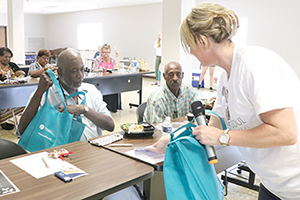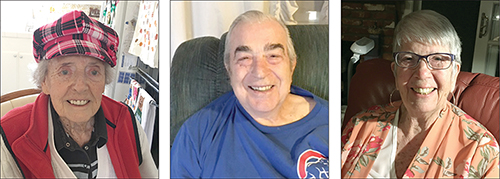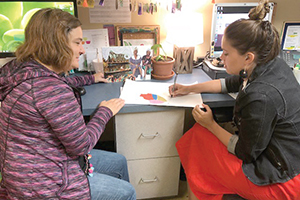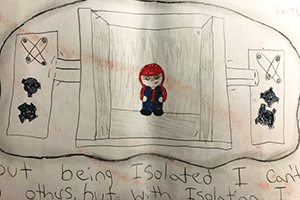By BETSY TAYLOR
A growing body of evidence indicates that loneliness is a risk factor harmful to health, so much so that scholars and care providers report a "loneliness epidemic" and call for concerted efforts to build social connections as a means of protecting a person's health.
Health care organizations offer a number of programs to combat social isolation, such as communal meals, friendly visitor programs and therapeutic interventions. (See below).

Pulling together data from multiple studies, Julianne Holt-Lunstad, a Brigham Young University professor who has led meta-analyses with other researchers on loneliness and its effects, writes in the Public Policy & Aging Report: "More than one third of adults over age 45 report being lonely, equating to over 42 million older adults who experience chronic loneliness. Even among those who are married, over 30 percent of relationships are severely discordant.
"Further, the majority of American adults do not participate in any kind of social group. Less than half of adults participate in a local religious group, and less than a quarter of adults participate in a social club, community group, sports league, or other local group. Taken together, this data suggest that a significant portion of the population, and older adults in particular, may be socially isolated/disconnected."
She goes on to say: "The overall magnitude of effect of social connection can be benchmarked against other well-established lifestyle risk factors. Lacking social connection carries a risk that is comparable, and in many cases exceeds that of other well-accepted risk factors, including smoking up to 15 cigarettes per day, obesity, physical inactivity, and air pollution."
Making connections
"I'm very lonely," says George Taylor, 67, of East St. Louis, Ill. He describes difficult times years ago that still hit him hard emotionally, including the death of his brother and his spouse within days of one another. He relocated back to southern Illinois a couple of years ago, and he says it can be tough to make new friends. "You're set in your ways; most adults have their own lives."
Taylor is attending the "Sole to Soul" lunch in June at Caritas Family Solutions in Belleville, Ill. The program derives its name from "sole" for the fish, and "soul" for the spirit. Others noted the lunches are designed for sole participants, with a tagline of "arrive alone and leave in community."
The lunches are for people age 60 and up and are hosted by The Esquiline, a continuum of care community for seniors located on the grounds of the National Shrine of Our Lady of the Snows in Belleville. They are staffed by employees and volunteers of The Esquiline. The meals are offered through a partnership between the AgeSmart Community Resources nonprofit and The Esquiline.
Each lunch features a different health care or wellness speaker, with some variety in the locations where the monthly lunch is offered to increase geographic reach. Some venues host more than one lunch, and participants may attend multiple lunches.

At this lunch there are more than 20 participants who are enrolled in a job readiness and employment program for those 60 and older based out of Caritas Family Solutions. The group enjoys grilled chicken and salad and sings "Happy Birthday" to one of their own. Jennifer Murphy, the Esquiline's director of life enrichment, gives the man a gratitude journal made by an area artist. Murphy talks about how reflecting on gratitude and writing about it in the journal can help promote positive feelings.
The day's speaker, Donna Heierman, directs Memorial Senior Care, an outpatient counseling program in Belleville for people age 65 and older who are coping with depression or anxiety. The program provides transportation and includes a mental health assessment, individual and group therapy and a shared hot meal, to allow for conversations and socialization to combat loneliness.
Taylor says he may give those group sessions a go.
At the Caritas Family Solutions center luncheon, attendee Pamela Jean Williams, 66, of Belleville, contributes to the discussion, describing the family, work and community involvements that keep her busy and connected to others. She asked a friend to the gathering, a woman who, Williams says, has increasingly withdrawn from others. Williams knows that staying home and ignoring her usual social connections isn't healthy for her friend. "She said no, but I'm not giving up."
Friendly visitors in California
Karyl Dupée is clinical supervisor of senior services and community care navigation for the Caring Neighbors program based out of St. Jude Medical Center in Fullerton, Calif. The medical center is part of Providence St. Joseph Health. Dupée says for an older adult loneliness can be a kind of "gateway drug" that leads to other problems. Loneliness sets the stage for the potential for elder abuse, for greater fall risk, for a person not taking their medications or taking them incorrectly, she says. The lonely are at greater risk for depression and deteriorating physical health.
The Caring Neighbors program background checks and trains volunteers — there are currently about 75 volunteers working with the program — and matches them to an older adult, whom they will visit at home. Clients often are referred to the program by physicians or other clinicians or pastors. Dupée asks the older adult if a volunteer can come visit. About 100 adults 65 and older, most of whom are in frail health, spend an hour and a half to three hours each week with their volunteer.
Dupée says it's rare that someone acknowledges loneliness off the bat. She tells clients that they've been paired with a volunteer who can help them age safely at home. Volunteers carry laundry up or down stairs and retrieve items from high shelves. They can assist with bill paying and perform light housekeeping tasks. Volunteers run errands. They'll accompany a client on a walk or play a board or card game.
Clients complete a depression survey twice a year and can be linked to mental health assistance. Volunteers tell Dupée or a clinical social worker if the older adult has unmet needs or wants the program can address. For instance, if a person can't afford adult diapers, the program provides them free of charge. At Christmas, participants are asked what they might wish for as a gift. The program has given clients everything from electronic tablets to warm slippers.
Dupée says by catching medical issues and unsafe living conditions, the volunteers can be lifesavers. She's twice dialed 911 for participants who appeared fine at the start of her visits but went into cardiac arrest while she was with them in their homes.
Not alone in feeling alone
In Colorado Springs, Colo., Centura Health's Penrose – St. Francis Health Services has a Healthy Church Initiative that helps faith communities more effectively serve the spiritual, emotional and physical health of their congregations and others. Among its services, it conducts spiritual well-being surveys that give insights across a congregation about health concerns. (Centura Health is sponsored by Catholic Health Initiatives and Adventist Health System.)
John Zondlo, facilitator for the Healthy Church Initiative, says from 2013 to 2016 — the most recent years the surveys were given to large numbers of congregations — 380 people or 18.8 percent of respondents said they suffered from loneliness, and 485 people or 20.9 percent of respondents called loneliness the social condition that has the most impact on their health. (It should be noted that respondents pointed to other issues as greater areas of concern for them. For instance, more people said they suffered from lack of self-esteem, lack of direction or physical pain than loneliness, but Zondlo says the survey helped the initiative determine that loneliness remains a pervasive problem in the congregations it serves.)
The Healthy Church Initiative trains faith community nurses and ministers to recognize and counter loneliness when they make a home visit to a congregant. Social disconnection may lead to or exacerbate physical, spiritual and mental health issues.
Barb Gilliland, visiting pastor/pastoral assistant with Faith Presbyterian Church in Colorado Springs, trained for home visits in a seminar taught by Zondlo. Gilliland says if one of the seniors she visits begins a rather one-sided, long-running conversation, it's a good bet that person is lonely and wants someone to listen to them.
Without the visits, "they have so much to say, and no one to say it to."
» View video of Penrose-St. Francis Healthy Church Initiative’s home visit program


